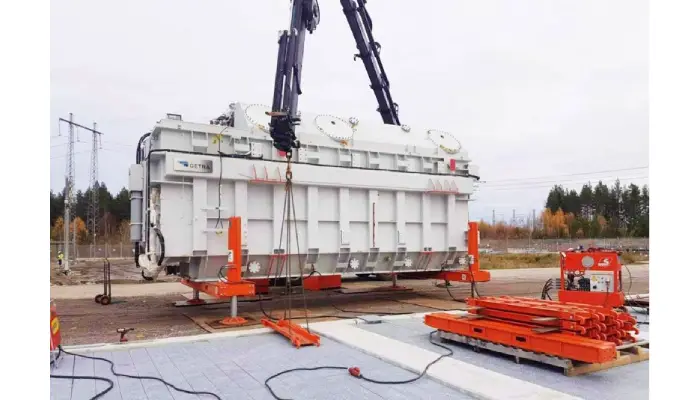The Role of 3rd Party Logistics Services in E-commerce
Third-party logistics (3PL) are essential for e-commerce, offering outsourcing for logistics, which helps businesses cut costs and focus on growth. However, challenges like loss of control may arise.

Third-party logistics (3PL) services have become vital in the e-commerce sector. By outsourcing logistics functions—like transportation, warehousing, and order fulfillment—e-commerce businesses can concentrate on what they do best, such as marketing and product innovation. This model helps reduce operational costs while leveraging the expertise of 3PL providers. They offer flexibility and scalability, allowing businesses to adjust their operations without hefty investments. However, challenges such as loss of control and integration issues can arise when partnering with a 3PL. As more companies recognize these benefits, the role of 3PLs is likely to grow further in this fast-evolving market landscape.
1. Definition of 3rd Party Logistics (3PL)
3rd Party Logistics service refers to the practice of outsourcing logistics and supply chain management functions to specialized third-party providers. This arrangement allows businesses to focus on their core activities, such as marketing and product development, while relying on 3PL companies to handle the complexities of transportation, warehousing, inventory management, and order fulfillment. For example, a small e-commerce retailer might partner with a 3PL to manage their shipping and storage needs, enabling them to offer faster delivery options without investing heavily in their own logistics infrastructure. By leveraging the expertise and resources of 3PL providers, companies can optimize their operations and improve overall efficiency in the highly competitive e-commerce landscape.
2. Key Functions of 3PL Services
3PL services play a crucial role in streamlining the logistics of e-commerce businesses. One of their primary functions is transportation management, where they optimize shipping routes and methods to reduce costs and improve delivery times. This helps businesses save money while ensuring that products reach customers promptly.
Warehousing is another essential function. 3PL providers offer flexible storage solutions, including fulfillment centers located near major markets. This not only reduces shipping times but also allows businesses to scale their warehousing needs based on demand fluctuations.
Additionally, effective inventory management is a key service. 3PLs provide systems that track inventory levels and manage stock replenishment, helping businesses avoid overstock situations and ensuring that products are available when customers need them.
Order fulfillment is perhaps the most visible function. 3PLs handle the picking, packing, and shipping of orders, which is vital for maintaining customer satisfaction. By managing these processes, they help businesses focus on their core activities, such as marketing and product development.
- Warehousing and storage solutions
- Order fulfillment and processing
- Inventory management and control
- Shipping and transportation services
- Packaging and labeling assistance
- Customs clearance and compliance
- Returns management and reverse logistics
3. Benefits of Using 3PL Services
Using third-party logistics (3PL) services offers several advantages for e-commerce businesses. One of the most significant benefits is flexibility and scalability. E-commerce companies can adjust their logistics operations quickly to match fluctuations in demand without having to make substantial investments in infrastructure. For example, during peak shopping seasons like the holidays, a business can ramp up its logistics capabilities without the burden of long-term commitments.
Access to advanced technologies is another key advantage. Many 3PL providers utilize state-of-the-art logistics software, such as warehouse management systems (WMS) and transportation management systems (TMS). This technology helps businesses streamline their operations and improve efficiency. For instance, a 3PL that employs real-time tracking systems allows e-commerce companies to provide accurate delivery updates to customers, enhancing overall satisfaction.
Improved customer service is also a crucial benefit. By outsourcing logistics, e-commerce businesses can focus more on their core functions, leading to better marketing strategies, product development, and customer engagement. With faster and more reliable shipping options provided by 3PLs, customers receive their orders promptly, resulting in higher satisfaction and increased chances for repeat purchases. This is particularly important in the competitive landscape of e-commerce, where customer expectations are continually rising.
4. Challenges and Considerations
Outsourcing logistics to 3PL providers can introduce several challenges that e-commerce businesses must navigate carefully. One primary concern is the potential loss of control over logistics operations. When companies hand over their supply chain management to a third party, they may find it difficult to maintain oversight, which can lead to miscommunication and inconsistencies in service quality. For instance, if a 3PL provider fails to meet delivery timelines, the e-commerce business’s reputation may suffer, even if the issue lies with the logistics partner.
Integration is another significant challenge. E-commerce companies need their systems to work seamlessly with those of the 3PL provider. Any integration issues can disrupt order processing and inventory management, resulting in delays and customer dissatisfaction. Businesses must invest time and resources into ensuring that their technology stacks align, which can be a complex and costly endeavor.
Furthermore, choosing the right 3PL partner is crucial. With many providers available, e-commerce businesses must thoroughly evaluate potential partners based on their reliability, reputation, and service offerings. A poor choice can lead to operational headaches and increased costs, negating the benefits of outsourcing. For example, a 3PL that lacks experience in handling specific product types may struggle, leading to damage or lost inventory.
Overall, while leveraging 3PL services can enhance efficiency and reduce costs, companies must be vigilant in addressing these challenges to ensure a successful partnership.
5. Trends in 3PL and E-commerce
The landscape of 3rd Party Logistics (3PL) is evolving rapidly, particularly in response to the surge in e-commerce. One notable trend is the increasing demand for faster delivery services. Customers now expect same-day or next-day shipping options, compelling 3PL providers to optimize their logistics processes accordingly. Companies like Amazon have set the bar high, pushing other e-commerce businesses to adopt similar strategies to stay competitive.
Sustainability is another critical focus for 3PL services. As consumers become more environmentally conscious, many logistics providers are implementing green practices. This includes reducing packaging waste, optimizing delivery routes to lower carbon emissions, and utilizing electric vehicles. For example, companies like DHL are investing in carbon-neutral logistics solutions, appealing to a market that values sustainability.
Moreover, technology is reshaping the logistics industry. The integration of artificial intelligence and machine learning into supply chain management is becoming commonplace. These technologies help 3PL providers analyze data more effectively, forecast demand, and enhance route planning. By leveraging these advancements, logistics companies can improve efficiency and reduce costs, ultimately benefiting e-commerce businesses.
Another trend is the rise of omnichannel fulfillment strategies. E-commerce companies are increasingly looking for 3PL partners that can support multiple sales channels, ensuring a seamless shopping experience for customers. This means that 3PL providers must be flexible and capable of handling diverse order fulfillment needs, from online sales to brick-and-mortar store deliveries.
Lastly, the emphasis on customer experience is driving changes in the 3PL sector. Customer service is paramount, and logistics providers are focusing on providing real-time tracking and communication. This transparency builds trust and satisfaction, encouraging repeat business. As e-commerce continues to grow, the collaboration between businesses and 3PL providers will be crucial in meeting evolving consumer expectations.
6. Future Outlook
The future of 3rd Party Logistics (3PL) in e-commerce looks promising as businesses increasingly recognize the benefits of outsourcing logistics. As online shopping continues to grow, the demand for efficient, scalable logistics solutions will rise. Companies will lean on 3PL providers to handle complexities like order fulfillment and transportation management, allowing them to focus on core business areas such as marketing and product innovation.
Technological advancements will play a significant role in shaping this landscape. For instance, the use of artificial intelligence and data analytics will enhance decision-making processes, making logistics operations more efficient. Innovations like automated warehouses and smart inventory systems will likely become standard, streamlining operations further.
Moreover, consumer expectations are evolving. Today’s shoppers seek faster delivery options and more sustainable practices. As a response, many 3PL providers are adopting green logistics initiatives, such as optimizing delivery routes to reduce emissions. This shift not only meets consumer demand but also positions businesses as responsible players in the market.
In summary, the synergy between e-commerce and 3PL services is set to deepen, driven by technological innovations and changing consumer preferences, making logistics a vital component of business strategy.
Frequently Asked Questions
1. What are 3rd party logistics services?
3rd party logistics services, often known as 3PLs, are companies that handle logistics and supply chain operations for e-commerce businesses. They manage tasks like warehousing, packaging, and shipping products to customers.
2. How do 3rd party logistics services help e-commerce businesses?
3rd party logistics services help e-commerce businesses by taking care of the shipping and storage process. This lets business owners focus on marketing and selling their products instead of worrying about how to get them to customers.
3. What types of services do 3rd party logistics companies offer?
3rd party logistics companies offer a range of services, including transportation, inventory management, order fulfillment, and sometimes even customer service to help make the entire selling process smoother for e-commerce businesses.
4. How can using a 3rd party logistics service improve delivery times?
Using a 3rd party logistics service can improve delivery times because these companies specialize in shipping and usually have established networks. They can quickly process orders and get products to customers faster than businesses might be able to do on their own.
5. Is it common for small e-commerce businesses to use 3rd party logistics services?
Yes, it’s quite common for small e-commerce businesses to use 3rd party logistics services. These services allow them to scale their operations without needing to invest heavily in their own warehouses or transportation systems.
TL;DR Third-party logistics (3PL) services play a crucial role in e-commerce by providing transportation, warehousing, inventory management, and order fulfillment. They help businesses reduce costs, improve efficiency, and enhance customer satisfaction. While 3PL offers benefits like flexibility and access to technology, companies must consider challenges such as loss of control and integration issues when choosing a provider. Trends like sustainability and tech adoption are shaping the future of 3PL in e-commerce, highlighting its growing importance.

Lyle Vasquez is a technology blogger based in Connecticut. He has been passionate about technology since early childhood when he used to take apart and rebuild computers in his parent’s garage. Lyle’s tech-related blog posts are written to help others learn how to use the latest technology tools and devices. He loves to find new ways to integrate technology into everyday life. Lyle is a great resource for tech enthusiasts looking to stay up to date on the latest technologies.





